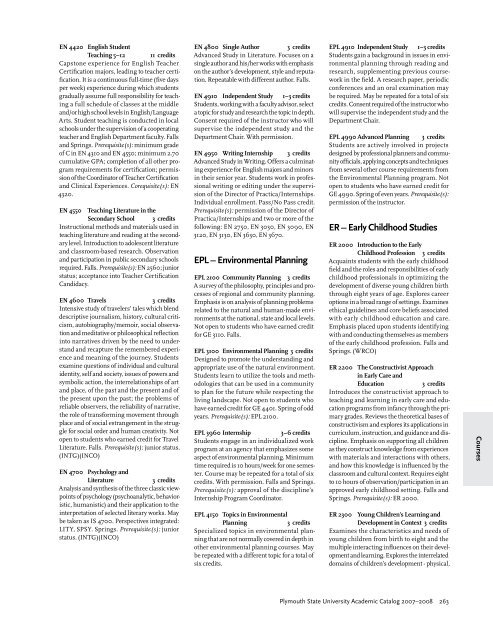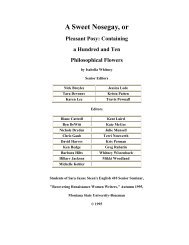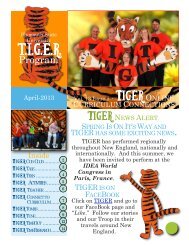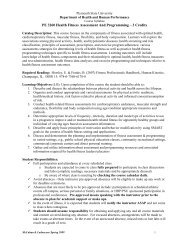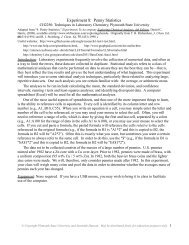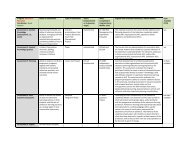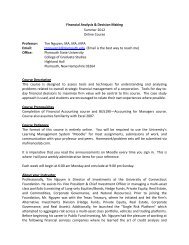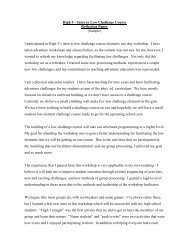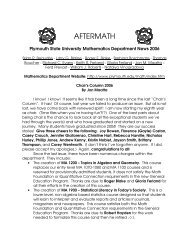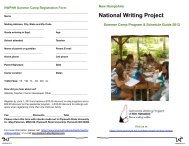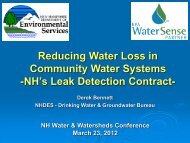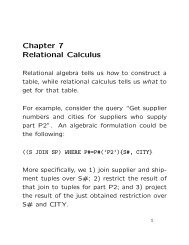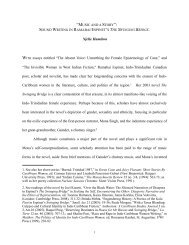2007-2008 Undergraduate Academic Catalog - Plymouth State ...
2007-2008 Undergraduate Academic Catalog - Plymouth State ...
2007-2008 Undergraduate Academic Catalog - Plymouth State ...
- No tags were found...
Create successful ePaper yourself
Turn your PDF publications into a flip-book with our unique Google optimized e-Paper software.
EN 4420 English StudentTeaching 5–12 11 creditsCapstone experience for English TeacherCertification majors, leading to teacher certification.It is a continuous full-time (five daysper week) experience during which studentsgradually assume full responsibility for teachinga full schedule of classes at the middleand/or high school levels in English/LanguageArts. Student teaching is conducted in localschools under the supervision of a cooperatingteacher and English Department faculty. Fallsand Springs. Prerequisite(s): minimum gradeof C in EN 4310 and EN 4550; minimum 2.70cumulative GPA; completion of all other programrequirements for certification; permissionof the Coordinator of Teacher Certificationand Clinical Experiences. Corequisite(s): EN4320.EN 4550 Teaching Literature in theSecondary School 3 creditsInstructional methods and materials used inteaching literature and reading at the secondarylevel. Introduction to adolescent literatureand classroom-based research. Observationand participation in public secondary schoolsrequired. Falls. Prerequisite(s): EN 2560; juniorstatus; acceptance into Teacher CertificationCandidacy.EN 4600 Travels3 creditsIntensive study of travelers’ tales which blenddescriptive journalism, history, cultural criticism,autobiography/memoir, social observationand meditative or philosophical reflectioninto narratives driven by the need to understandand recapture the remembered experienceand meaning of the journey. Studentsexamine questions of individual and culturalidentity, self and society, issues of powers andsymbolic action, the interrelationships of artand place, of the past and the present and ofthe present upon the past; the problems ofreliable observers, the reliability of narrative,the role of transforming movement throughplace and of social estrangement in the strugglefor social order and human creativity. Notopen to students who earned credit for TravelLiterature. Falls. Prerequisite(s): junior status.(INTG)(INCO)EN 4700 Psychology andLiterature3 creditsAnalysis and synthesis of the three classic viewpointsof psychology (psychoanalytic, behavioristic,humanistic) and their application to theinterpretation of selected literary works. Maybe taken as IS 4700. Perspectives integrated:LITY, SPSY. Springs. Prerequisite(s): juniorstatus. (INTG)(INCO)EN 4800 Single Author 3 creditsAdvanced Study in Literature. Focuses on asingle author and his/her works with emphasison the author’s development, style and reputation.Repeatable with different author. Falls.EN 4910 Independent Study 1–3 creditsStudents, working with a faculty advisor, selecta topic for study and research the topic in depth.Consent required of the instructor who willsupervise the independent study and theDepartment Chair. With permission.EN 4950 Writing Internship 3 creditsAdvanced Study in Writing. Offers a culminatingexperience for English majors and minorsin their senior year. Students work in professionalwriting or editing under the supervisionof the Director of Practica/Internships.Individual enrollment. Pass/No Pass credit.Prerequisite(s): permission of the Director ofPractica/Internships and two or more of thefollowing: EN 2750, EN 3030, EN 3090, EN3120, EN 3130, EN 3630, EN 3670.EPL – Environmental PlanningEPL 2100 Community Planning 3 creditsA survey of the philosophy, principles and processesof regional and community planning.Emphasis is on analysis of planning problemsrelated to the natural and human-made environmentsat the national, state and local levels.Not open to students who have earned creditfor GE 3110. Falls.EPL 3100 Environmental Planning 3 creditsDesigned to promote the understanding andappropriate use of the natural environment.Students learn to utilize the tools and methodologiesthat can be used in a communityto plan for the future while respecting theliving landscape. Not open to students whohave earned credit for GE 4401. Spring of oddyears. Prerequisite(s): EPL 2100.EPL 3960 Internship 3–6 creditsStudents engage in an individualized workprogram at an agency that emphasizes someaspect of environmental planning. Minimumtime required is 10 hours/week for one semester.Course may be repeated for a total of sixcredits. With permission. Falls and Springs.Prerequisite(s): approval of the discipline’sInternship Program Coordinator.EPL 4150 Topics in EnvironmentalPlanning3 creditsSpecialized topics in environmental planningthat are not normally covered in depth inother environmental planning courses. Maybe repeated with a different topic for a total ofsix credits.EPL 4910 Independent Study 1–3 creditsStudents gain a background in issues in environmentalplanning through reading andresearch, supplementing previous courseworkin the field. A research paper, periodicconferences and an oral examination maybe required. May be repeated for a total of sixcredits. Consent required of the instructor whowill supervise the independent study and theDepartment Chair.EPL 4990 Advanced Planning 3 creditsStudents are actively involved in projectsdesigned by professional planners and communityofficials, applying concepts and techniquesfrom several other course requirements fromthe Environmental Planning program. Notopen to students who have earned credit forGE 4990. Spring of even years. Prerequisite(s):permission of the instructor.ER – Early Childhood StudiesER 2000 Introduction to the EarlyChildhood Profession 3 creditsAcquaints students with the early childhoodfield and the roles and responsibilities of earlychildhood professionals in optimizing thedevelopment of diverse young children birththrough eight years of age. Explores careeroptions in a broad range of settings. Examinesethical guidelines and core beliefs associatedwith early childhood education and care.Emphasis placed upon students identifyingwith and conducting themselves as membersof the early childhood profession. Falls andSprings. (WRCO)ER 2200 The Constructivist Approachin Early Care andEducation3 creditsIntroduces the constructivist approach toteaching and learning in early care and educationprograms from infancy through the primarygrades. Reviews the theoretical bases ofconstructivism and explores its applications incurriculum, instruction, and guidance and discipline.Emphasis on supporting all childrenas they construct knowledge from experienceswith materials and interactions with others,and how this knowledge is influenced by theclassroom and cultural context. Requires eightto 10 hours of observation/participation in anapproved early childhood setting. Falls andSprings. Prerequisite(s): ER 2000.ER 2300 Young Children’s Learning andDevelopment in Context 3 creditsExamines the characteristics and needs ofyoung children from birth to eight and themultiple interacting influences on their developmentand learning. Explores the interrelateddomains of children’s development - physical,Courses<strong>Plymouth</strong> <strong>State</strong> University <strong>Academic</strong> <strong>Catalog</strong> <strong>2007</strong>–<strong>2008</strong> 263


